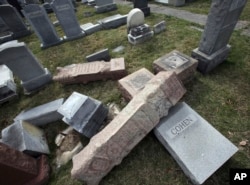A Jewish advocacy group is calling on U.S. President Donald Trump to step up federal efforts to stamp out hate crimes after vandalism at a slew of Jewish cemeteries and bomb threats at schools have raised concerns for some in the Jewish community.
Jonathan Greenblatt, national director of the Anti-Defamation League, told VOA he wants to see the federal government take several actions, including a federal hate crime investigation of the recent bomb threats and vandalism to stop the “surge of hate crimes” that have taken place since the election.
“They need to know that the full force of the federal government is prepared to weigh in against their intolerance and hate,” Greenblatt said of those who seek to discriminate against or harm Jewish people.
Greenblatt’s comments came after Jewish Community Centers in at least 12 states received bomb threats on Monday, according to the JCC Association of North America. It was the fifth such day-long campaign of nationwide bomb threats since January.
In addition to the bomb threats, vandals over the weekend damaged hundreds of headstones at a Jewish cemetery in Philadelphia, some of which dated back to the 1800s. Police, in this case, said they hadn’t confirmed a motive in the vandalism, though they suspect it was targeted at Jews.
A similar incident happened in St. Louis last week, when vandals damaged more than 150 headstones at a Jewish cemetery in the suburbs of the Midwestern city.
Greenblatt said he was unsure whether all the incidents are related or who is responsible for them, though he ascribed them to a rise in anti-Semitic hate stemming from Trump’s election.
“The spike in hate crimes after the election targeted the Jewish community with vandalism, assault, and now since January 1st, bomb threats to Jewish community centers, day schools and the offices of the ADL,” he said.
While Greenblatt said there has been a “spike in hate crimes” since Trump was elected, statistics regarding hate crimes reported by the FBI have not yet been released for 2016 and a count recorded by the Southern Poverty Law Center – which is often cited in news coverage – is populated largely by self-reported, unverified “hate incidents,” which don’t necessarily represent crimes.
In 2015, the most recent year with available statistics, the FBI reported 5,850 hate crime incidents, or roughly 16 per day. In 2010, the FBI reported 6,628 hate crime incidents, or just more than 18 per day. Between 2010 and 2015, hate crime incidents dropped by almost 12 percent, according to the FBI statistics.
The SPLC report shows 220 “hate incidents” reported on November 9, the day after Trump’s election. By November 13, the daily number of reported incidents fell to 52, and by December 12, the last day recorded by the SPLC, the number of daily incidents was one.
While the SPLC tally is likely incomplete, the data doesn’t show any increase in “hate incidents” beyond Trump’s first week in office and is well below the FBI average following his second week.
Though he lacks statistical proof of a spike in hate crimes, Greenblatt said he wants the federal government to institute an inter-agency task force for fighting anti-Semitism, he wants the FBI to provide hate crime training for local police forces, and he wants the Department of Education to provide “anti-bias and anti-hate” materials to schools, in an effort to solve the problem.
Greenblatt said he is “really heartened and grateful” that Vice President Mike Pence visited the Nazi extermination camp at Dachau last week on his first overseas trip and went to the St. Louis cemetery targeted by vandals to help with clean-up, but that is not enough.
“It’s great that he spoke out, but now we need to move beyond words and we need action,” Greenblatt said.





